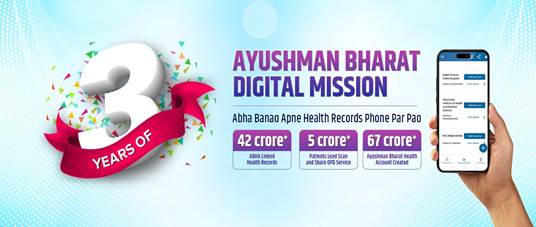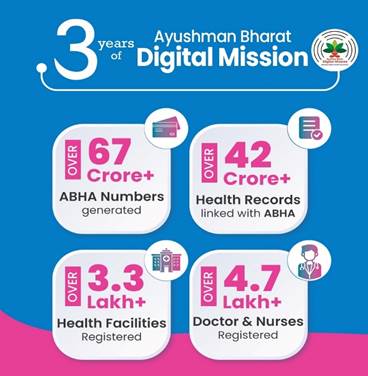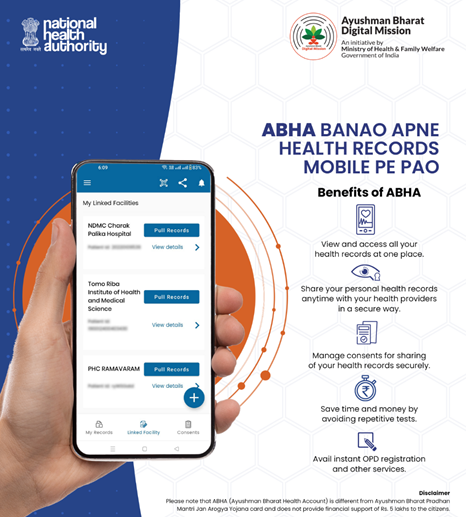Launched on 27th September 2021 with the vision of establishing a robust digital health infrastructure, the Ayushman Bharat Digital Mission (ABDM) has embarked on a transformative three-year journey with the aim to revolutionize the nation’s digital healthcare ecosystem to enhance healthcare accessibility, efficiency, and transparency. It leverages Digital Public Infrastructure (DPI) to enable interoperability in digital health transactions.

The objective can be traced back to the National Health Policy (2017), which had specific goals for accessibility, a wellness-centric approach, and digital technologies. This was followed by the National Health Stack (2018) with components for digital health like unique health identifiers and verified registries, and in turn, followed by the National Digital Health Blueprint (2019) providing guidance for the implementation of ABDM.
Key Features of ABDM:
Unique Health identifier for citizens: A unique Health ABHA ID for every individual establishing a strong and trustworthy identity to store and manage health records.
Healthcare Professionals Registry (HPR): Comprehensive repository of all healthcare professionals involved in delivery of healthcare services across both modern and traditional systems of medicine. It will enable them to get connected to India’s digital health ecosystem.
Health Facility Registries (HFR): Comprehensive repository of health facilities of the nation across different systems of medicine. It includes both public and private health facilities including hospitals, clinics, diagnostic laboratories and imaging centers, pharmacies, etc.
Health Information Exchange and Consent Manager (HIE-CM): Empowers citizens to securely access and share their health records, ensuring that data exchange is driven by informed consent.
Unified Health Interface (UHI): Facilitates the discovery and delivery of health services, thereby streamlining healthcare interactions and improving service accessibility.
National Health Claims Exchange (HCX): Standardizes the insurance payment ecosystem, simplifying and expediting the claim process.
Data Privacy and Security: Security, confidentiality, and privacy of health-related personal information are at the core of this initiative. In alignment with the Digital Personal Data Protection Act, 2023 (DPDP Act) the federated architecture of the ABDM ensures the security, confidentiality, and secure sharing of patient related health information.
Interoperability: Facilitates seamless and efficient healthcare delivery by enabling secure data exchange among various stakeholders in the healthcare ecosystem. Additionally, three gateways facilitate interoperability that are Health Information Consent Manager (HIE-CM), the National Health Claims Exchange (NHCX), and Unified Health Interface (UHI).
Transparency: It provides choice to individuals to access both public and private health services, facilitate compliance with laid down guidelines and protocols, and ensure transparency in pricing of services and accountability for the health services being rendered.
Key Initiatives of ABDM:
Scan and Share: A QR-code based OPD registration service to enable patients to scan the QR code of the facility and share their demographic details. This minimizes the long queues at the registration counter and reduces the entry of incomplete and inaccurate data. It has recorded over 5 crore OPD tokens, significantly reducing waiting times from one hour to half an hour, further saving 2.5 crore man-hours.
Digital Health Incentive Scheme (DHIS): Financial incentives to booster adoption and encourage the ecosystem to participate in the ABDM ecosystem were introduced from 1st Jan 2023. It gives the opportunity to earn incentives of up to 4 crores and has gained significant traction among private and public players. This initiative has been encouraging the adoption and implementation of digital health practices.
Microsites for Private Sector Adoption: The Microsite initiative, aimed at addressing various challenges in ABDM adoption, especially for private sector providers, has successfully operationalized 106 microsites, surpassing the initial target of 100.
End to End ABDM Adoption Pilot: The objective of the pilot is to digitize public and private facilities pan-India across different facility levels through end-to-end ABDM Adoption. The aim is to make these facilities into model ABDM facilities that will serve as a benchmark for future digitization efforts. As of July 27th Sept 2024, a total of 131 healthcare facilities have been selected for participation.
Achievements of ABDM:
Over 67 crore Ayushman Bharat Health Accounts (ABHA) have been created, providing citizens with unique digital health IDs for secure access and sharing of health records. Additionally, more than 42 crore health records have been linked to ABHA, enabling seamless access to medical histories and enhancing healthcare delivery.
It has made significant progress by involving major private and public players in the digital health ecosystem since its launch. Over 236 private entities including labs, pharmacies, digital solution companies have integrated with the ABDM ecosystem, joining hands to achieve interoperability. The public sector, institutions such as AIIMS Delhi and AIIMS Bhopal and many more have emerged as top performers in generating Scan and Share OPD registrations. These efforts, along with contributions from various leading private healthcare chains have significantly contributed to the success of the ABDM. Currently, over 1.3 lakh facilities are ABDM-enabled, including more than 17,000 private facilities.

With the launch of the National Healthcare Providers Registry (NHPR), a comprehensive repository of registered healthcare professionals and health facilities, 3.3 lakh health facilities and 4.7 lakh healthcare professionals have been successfully registered. Additionally, the National Health Authority (NHA) has developed portals such as the National Medical Register (NMC) for the National Medical Commission and the National Dental Register (NDR) for the National Dental Council.
Moving Towards Transformation:
ABDM has been able to drive transformation and increase its footprints by leveraging several partnerships to enhance digital healthcare services. From collaborating with IIT Kanpur for the development of digital public goods in AI for healthcare to signing an MoU with Maharashtra University of Health Sciences (MUHS) to drive digital health education into medical curricula, the organization has expanded its efforts to bring about a digital transformation in the healthcare sector. Additionally, in the view of digital health learning, ABDM has driven transformation through training and sensitizing stakeholders to better understand and adopt digital health practices. The National Health Authority has introduced a WhatsApp Chatbot, serving as a user-friendly platform to train stakeholders involved in ABDM.
Moreover, various associations and initiatives are advocating for the integration of digital health as a critical component of healthcare. For example, the National Accreditation Board of Hospitals (NABH) launched the first edition of its Digital Health Standards for HIS/EMR Systems, aimed at accelerating the adoption of digital health technologies in India. Furthermore, the eSwasthya Dham portal has been integrated with ABDM, extending its benefits to Char Dham Yatris.
ABDM envisions a seamless digital health ecosystem where every Indian citizen has access to their own health records. A unique Health ABHA ID for every individual, establishing a strong and trustworthy identity that will help link all health-related information across various healthcare providers and institutions. Through ABHA, citizens can avail themselves of several digital health benefits, from avoiding long queues at healthcare facilities for registration to facilitating doctor appointments. Under this mission, the Clinical Decision Support System (CDSS) is being made available to healthcare professionals to facilitate the adoption of digital health practices. This initiative aims to enhance clinical decision-making, improve patient outcomes, and streamline healthcare delivery. In addition, it will allow healthcare providers easy access to patient histories, enabling them to make more informed decisions, leading to better diagnoses and treatment outcomes.

By creating a single source of truth through trinity of registries (ABHA, HPR and HFR) and trinity of gateways (HIECM, UHI and NHCX) for its stakeholders, the Ayushman Bharat Digital Mission holds immense potential to transform India’s healthcare landscape.
 Matribhumi Samachar English
Matribhumi Samachar English


